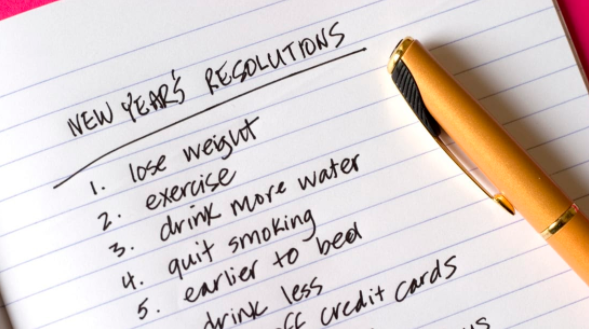The Most Popular New Year’s Resolutions of 2021 and How to Maintain Yours

Image courtesy of MentalFloss.com
January 13, 2021
Every year on January 1st, most people decide to remake themselves with a long list of changes they want to make in their lives, usually somehow relating to improved physical, mental, or emotional health. The New Year usually brings crowded gyms, healthy eating plans, and hard work at jobs, but by February, most resolutions are forgotten and left behind. According to Happy Habits, most years the most common resolutions are to exercise more, save money, and eat healthier, but how did a global pandemic and world-wide lockdown affect peoples’ goals for the new year and how can we make sure to stick to our resolutions?
Last year, a survey conducted by Happy Habits, 27% of people were enacting resolutions starting January 1st, but in the same survey conducted at the beginning of 2021 that figure rose to 41%. This could be due to the new lifestyle involving an excessive amount of time to spend on self and home improvement. Even in a year with a continuing global pandemic, some very popular resolutions were still reported and enacted. According to Statista, 44% of people planned to exercise more, 42% were ready to eat healthier, and 31% hoped to lose weight (percentages exceed an 100% total because in this study people were able to report multiple resolutions). Every year people use the new year to benchmark their changes, and these resolutions have been taunting the majority of people who try every year to achieve the same goal. Some noticeable changes from last year are spending more time with family and friends (34%), living more economically (32%), and spending less time on social media (24%). They all seem very timely for this year and it is very understandable that being on lockdown without seeing family and friends makes you miss your friends and family, the loss of many jobs this year means people are working hard to save their money, and with all the extra time at home, social media use was up 400% according to NPR, so cutting that back on that makes sense. According to a different survey conducted by Offers.com, 17% of people wanted to increase their nationwide and worldwide travel. Once again, in a year where travel was scarce, people seem to be looking forward to the prospect of resuming their adventures around the country and the world. Finally, a whopping 50% of people made job related resolutions, may it be to improve their job performance, reduce their stress while working, or even to get a job.
According to FSU News, on average, 80% of New Year’s resolutions fail by the second week of February. Good habits, especially ones drastically different from typical lifestyles, are hard to get started and even harder to keep. Research shows that on average, it takes approximately 66 days for a habit to become automatic. This means that your New Year’s Resolution will not become a habit until you have done it for over 2 months. Pushing yourself everyday until the beginning of March is the only way to make your New Year’s Resolution a habit. In addition, a study conducted by Business Insider found that one of the biggest reasons people fail to keep their New Year’s resolutions is because they’re not specific enough. For example, resolving to “exercise more” or “lose weight” are easy ways to set yourself up for failure, as they lack ways to mark progress and are unlikely to keep you motivated throughout the year. Instead, try making your goal specific, like running a particular 5K you have circled on the calendar or eating 7 servings of vegetables a day. This way, it is easy to track and measure your progress throughout the year.
Setting aside the fact that these are trying times, people are still committing to making changes in their lives for the better, and if you haven’t already, you should too. There is nothing special about starting something new on the 1st of January. You can pick one of 2021’s most popular resolutions, or be creative and come up with your own, but make sure that it is specific. Stay at it for at least 2 months to make it a habit, and have family or friends remind you to stay on track when the going gets tough. Take a few days to plan, make a specific goal, and then get motivated and moving towards a better version of yourself!









